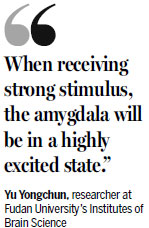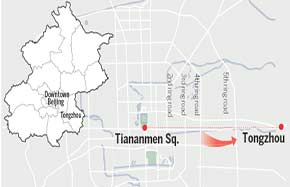Scientists publish method to block fearful memories
Chinese scientists say they've found a new way to effectively inhibit a person's fear memory arising from traumatic events such as domestic violence, sexual assault and war.
Animal testing led by Yu Yongchun, a researcher at Fudan University's Institutes of Brain Science in Shanghai, found that fear can be effectively removed by transplanting a special kind of nerve cell into the brains of an adult mouse.
The findings are expected to shine new light on the treatment of severe mental conditions, such as post-traumatic stress disorder, or PTSD. The results were published online on Friday by Neuron, an influential journal in the field of neuroscience.
Yu's team noted that there are two types of neurons in the brain - excitory and inhibitory. Balanced activity between the two types of neurons allows the brain to function normally.

The part of the brain's nucleus known as the amygdala is a key area for processing fear information and developing fear memory.
"When receiving strong stimulus, the amygdala will be in a highly excited state, leading to a new excitory/inhibitory balance that may contribute to fear memory," Yu said.
Based on its analyses, Yu's team proposed that transplanting immature inhibitory neurons into a highly excited mature amygdala could not only inhibit the overexcitement of the amygdala, but also make the adult amygdala seem younger, thereby suppressing the recall of fear memory.
The hypothesis has been borne out in a series of experiments on mice, Yu said, but there's a long way to go before the treatment can be tried on humans in a clinical setting.
Yet the research is expected to help explore new strategies for treating PTSD, which is caused by indelible and traumatic memories like domestic violence, traffic accidents, hairy spiders, a nasty breakup or military combat.
Patients with PTSD often exhibit anxiety, depression, chronic pain, cardiovascular disease, metabolic disorders, drug abuse and alcohol addiction. Statistics show that about 80 percent of adults have experienced a traumatic event at least once in their lifetimes, while 5 to 10 percent have experienced severe psychological trauma that can be diagnosed as PTSD.
So far, the treatment of PTSD involves a combination of psychology and medication. However, mental symptoms often return after the treatment is stopped.
Wu Yiwei contributed to this story.
wanghongyi@chinadaily.com.cn

























